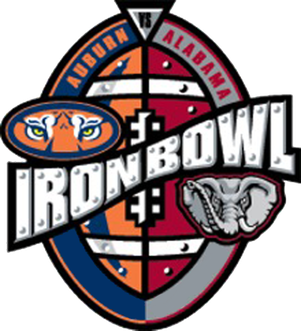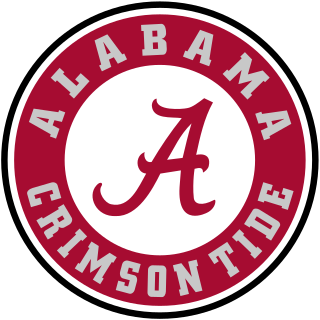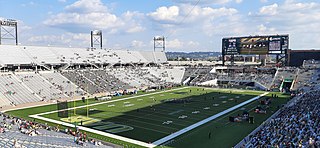
Bryant–Denny Stadium is an outdoor stadium in the southeastern United States, on the campus of the University of Alabama in Tuscaloosa. It is the home field of the Alabama Crimson Tide football team of the Southeastern Conference (SEC).

Legion Field is an outdoor stadium in the southeastern United States in Birmingham, Alabama, primarily designed to be used as a venue for American football, but occasionally used for other large outdoor events. Opened in 1927, it is named in honor of the American Legion, a U.S. organization of military veterans.

The Alabama–Auburn football rivalry, better known as the Iron Bowl, is an American college football rivalry game between the University of Alabama Crimson Tide and the Auburn University Tigers, both charter members of the Southeastern Conference (SEC) and both teams are located in the state of Alabama. The series is considered one of the most important football rivalries in American sports. The rivalry, which started in 1893, was played for many years at Legion Field in Birmingham, Alabama. In the early 20th Century, Birmingham was the leading industrial city of the South, rivaling Pittsburgh, Pennsylvania in the production of pig iron, coke, coal and the manufacture of steel. Thus, the term "Iron Bowl" came to represent the rivalry. Auburn Coach Ralph "Shug" Jordan is credited with actually coining it—when asked by reporters in 1964 how he would deal with the disappointment of not taking his team to a bowl game, he responded, "We've got our bowl game. We have it every year. It's the Iron Bowl in Birmingham."

Jordan-Hare Stadium is an American football stadium in Auburn, Alabama on the campus Auburn University. It primarily serves as the home venue of the Auburn Tigers football team. The stadium is named for Ralph "Shug" Jordan, who owns the most wins in school history, and Cliff Hare, a member of Auburn's first football team as well as Dean of the Auburn University School of Chemistry and President of the Southern Conference. On November 19, 2005, the playing field at the stadium was named in honor of former Auburn coach and athletic director Pat Dye. The venue is now known as Pat Dye Field at Jordan-Hare Stadium. The stadium reached its current seating capacity of 88,043 with the 2023 expansion and is the 10th largest stadium in the NCAA and the 20th largest in the world. For years, it has been a fixture on lists of best gameday atmospheres and most intimidating places to play.

Hoover Metropolitan Stadium, also known as The Hoover Met, is a baseball stadium located in Hoover, Alabama, United States, a suburb of Birmingham. It was home of the Birmingham Barons of the Southern League from 1988 to 2012, replacing historic Rickwood Field in Birmingham. The stadium also serves as the home for the SEC baseball tournament, as well as the primary home for Hoover High School football. It is located in the Birmingham-Hoover Metropolitan Area near Interstate 459 at Exit 10 just off Alabama State Route 150. The stadium is located three miles from the Riverchase Galleria, one of the south's largest shopping centers.

The 2002 Alabama Crimson Tide football team represented the University of Alabama in the 2002 NCAA Division I-A football season. It was the Crimson Tide's 108th overall season, 70th as a member of the Southeastern Conference (SEC) and its 11th within the SEC Western Division. The team was led by head coach Dennis Franchione, in his second year, and played their home games at Bryant–Denny Stadium in Tuscaloosa, Alabama. They finished the season with a record of 10–3 to finish in first place in the SEC West; however, the team was ineligible to compete in the 2002 SEC Championship Game or a bowl game due to a two-year postseason ban imposed as part of the penalty for National Collegiate Athletic Association (NCAA) violations.

The 1979 Alabama Crimson Tide football team represented the University of Alabama in the 1979 NCAA Division I-A football season. It was the Crimson Tide's 85th overall and 46th season as a member of the Southeastern Conference (SEC). The team was led by head coach Bear Bryant, in his 22nd year, and played their home games at Bryant–Denny Stadium in Tuscaloosa and Legion Field in Birmingham, Alabama. They finished the season undefeated and with a victory over Arkansas in the Sugar Bowl. For their collective efforts, the Crimson Tide were recognized as consensus national champions for the 1979 season.
The 1977 Alabama Crimson Tide football team represented the University of Alabama in the 1977 NCAA Division I football season. It was the Crimson Tide's 83rd overall and 44th season as a member of the Southeastern Conference (SEC). The team was led by head coach Bear Bryant, in his 20th year, and played their home games at Bryant–Denny Stadium in Tuscaloosa and Legion Field in Birmingham, Alabama. They finished season with eleven wins and one loss, as SEC champions and with a victory over Ohio State in the Sugar Bowl.
The 2000 Alabama Crimson Tide football team represented the University of Alabama in the 2000 college football season. The team was led by head coach Mike DuBose, who was coaching his final season at the program. The team finished 6th in the SEC Western Division. The Crimson Tide, also known informally as the Tide, played their home games at Bryant–Denny Stadium, in Tuscaloosa, Alabama, and Legion Field, in Birmingham, Alabama.
The 1997 Alabama Crimson Tide football team represented the University of Alabama in the college football season of 1997–98. The team's head coach was Mike DuBose, who was entering his first year at Alabama. They played their home games at both Bryant–Denny Stadium in Tuscaloosa and Legion Field in Birmingham, Alabama, and competed in the West Division of the Southeastern Conference. Alabama would finish with a record of 4–7 record in suffering the program's first losing season since the 1984 season. The loss against Kentucky marked Alabama's first ever overtime game, as overtime rules for college football had gone into effect the previous season.
The 1982 Alabama Crimson Tide football team represented the University of Alabama in the 1982 NCAA Division I-A football season. It was the Crimson Tide's 88th overall and 49th season as a member of the Southeastern Conference (SEC). The team was led by head coach Bear Bryant, in his 25th and final year, and played their home games at Bryant–Denny Stadium in Tuscaloosa and Legion Field in Birmingham, Alabama. They finished season with eight wins and four losses and with a victory over Illinois in the Liberty Bowl.
Denny Field was located in Tuscaloosa, Alabama, and served as the home field for the University of Alabama football team from 1915 through the 1928 seasons, excluding 1918 when a team was not fielded due to World War I. The field was located at the intersection of 10th Street and 7th Avenue at the southern edge of the University of Alabama campus. At present, its former location is the site of portions of the new sorority row along Judy Bonner Drive and a parking lot.
The 1935 Alabama Crimson Tide football team represented the University of Alabama in the 1935 college football season. It was the Crimson Tide's 42nd overall and 3rd season as a member of the Southeastern Conference (SEC). The team was led by head coach Frank Thomas, in his fifth year, and played their home games at Denny Stadium in Tuscaloosa and Legion Field in Birmingham, Alabama. They finished the season with a record of six wins, two losses and one tie.
The 1976 Liberty Bowl, part of the 1976 bowl game season, took place on December 20, 1976, at Liberty Bowl Memorial Stadium in Memphis, Tennessee. The competing teams in the 18th edition of the Liberty Bowl were the Alabama Crimson Tide, representing the Southeastern Conference (SEC), and the UCLA Bruins, representing the Pacific-8 Conference (Pac-8). Alabama won the game, 36–6.

The Alabama Crimson Tide women's soccer team is an intercollegiate varsity team representing the University of Alabama. The Alabama Crimson Tide competes in Division I of the National Collegiate Athletics Association (NCAA) and in the Southeastern Conference (SEC). Home games are played at the Alabama Soccer Stadium on the University of Alabama campus. Wes Hart is the current head coach of the Crimson Tide, a position he has occupied since 2015.
The ULM Soccer Complex was built in 2006. The complex features covered bench areas for both teams and a press box, with seating for 500 spectators and standing room for many more. ULM soccer field was the first home of ULM women's soccer and it saw its first action on Aug. 27, 2006, as ULM played McNeese State University, but lost 0–2. The Warhawks has compiled an 18-37 overall record on ULM Soccer Complex field.
The Western Michigan University Soccer Complex is a soccer-specific stadium located in Kalamazoo, Michigan on the campus of Western Michigan University. Originally known as Lee Baker Field, the complex is adjacent to WMU's Business, Technology & Research Park and the Engineering College campus, and is home to both the Western Michigan Broncos men's and women's soccer teams. The stands seat about 500, and there is standing room along the fencelines, particularly on the north and west sides.

The 2016 Alabama Crimson Tide football team represented the University of Alabama in the 2016 NCAA Division I FBS football season. This season marked the Crimson Tide's 122nd overall season, 83rd as a member of the Southeastern Conference (SEC) and its 25th within the SEC Western Division. They played their home games at Bryant–Denny Stadium in Tuscaloosa, Alabama and were led by tenth year head coach Nick Saban. They finished the season 14–1, were SEC champions and advanced to the College Football Playoff National Championship game, for the second consecutive year, where they were defeated by Clemson.

Protective Stadium is a football stadium owned and operated by the Birmingham-Jefferson Civic Center Authority in downtown Birmingham, Alabama, U.S. Since its opening in 2021, the stadium has been named for Protective Life, a financial service holding company based in Birmingham, which pays $1 million per year as part of a 15-year naming rights deal.









